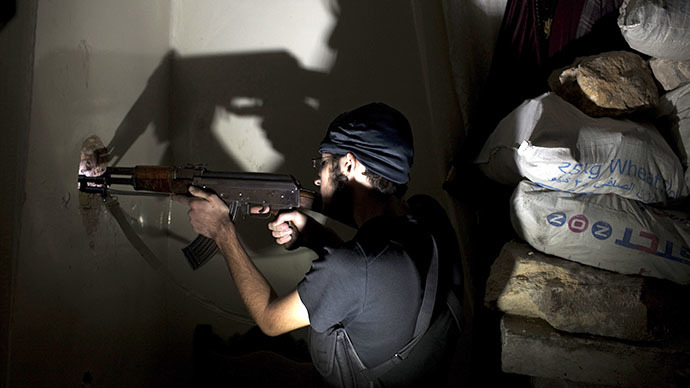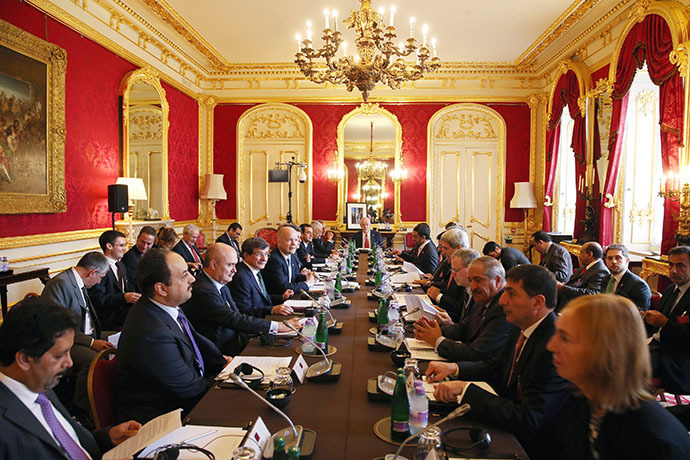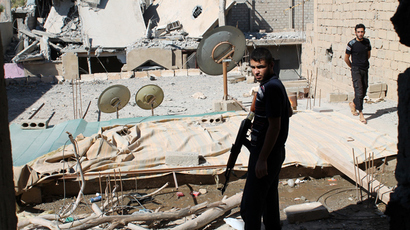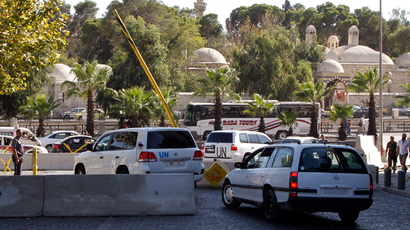19 Syrian rebel groups refuse to take part in Geneva-2 peace talks

A total of 19 Syrian rebel groups fighting against President Bashar Assad’s regime have refused to take part in the upcoming Geneva-2 peace conference, brokered by Russia and the United States and planned for November.
"We announce that the
Geneva 2 conference is not, nor will it ever be, our people's
choice or our revolution's demand," the groups said Saturday
in an online video message recorded by Ahmad Eissa al-Sheikh,
chief of the Suqur al-Sham Brigade, AFP reports.
"We consider it just another part of the conspiracy to throw our revolution off track and to abort it,” he said, adding that actions of those choosing to disobey this recommendation would be viewed as "treason” and result in the groups having “to answer for it before our courts."
The rejection of the peace conference had been somewhat telegraphed in advance, as a few weeks ago many of Syria’s opposition groups declared that one of the main umbrella opposition groups – the Syrian National Coalition – had “failed.”
The much-delayed Geneva-2 peace talks have been repeatedly scuppered by opposition groups in the past, saying that they would only participate if Assad stepped down.
The talks were intended to bring to the negotiating table the ruling regime and the opposition with the intention of finding a workable solution to the Syrian conflict, which recently passed the point of an estimated 100,000 deaths since it started 2 1/2 years ago.

Meanwhile, the Syrian National
Coalition reiterated that Assad must step down before they would
go to Geneva-2. The coalition plans to decide whether to attend
at a meeting on Nov. 9.
During a Friends of Syria meeting in London on Oct. 22, Western nations and Middle Eastern allies of the opposition tried to pressure opposition leader Ahmad Jarba to join the talks, despite Assad insisting that he would not be stepping down. But Jarba insisted: “Geneva cannot succeed and we cannot take part if it allows Assad to gain more time to spill the blood of our people while the world looks on,” Reuters cited him as saying.
British Foreign Secretary William Hague has said that all sections of the Western-sponsored Syrian opposition must be represented at the talks for Geneva-2 to succeed.
Assad recently said in an interview with Lebanon's Al-Mayadeen TV channel that “the factors are not yet in place if we want [Geneva-2] to succeed."
"Which forces are taking part? What relation do these forces have with the Syrian people? Do these forces represent the Syrian people, or do they represent the states that invented them?" he said.
Moscow lashed out at the Friends of Syria group for what it described as an attempt to revise key elements of the Geneva communiqué of 2012, thereby attempting to influence the conference’s outcome.
In response to the 19 groups’ decision not to go to the Geneva
peace talks, senior Russian lawmaker Aleksey Pushkov said it
indicated a pre-meditated strategy by the opposition’s Western
backers: “Nineteen groups in the Syrian opposition, which is
incapable of acting without outside support, ‘rejected’
Geneva-2,” Pushkov said. “It means their sponsors want it
to fall through.”
Under UN Security Resolution 2118, it argued, the communiqué is the only recognized document that acts as a “platform to achieve a political settlement.” But the discussions between the 11 foreign ministers at the group were not held on the basis of that document, Moscow said.
Damascus, meanwhile, has complied with all the requests leveled at it under the recently reached chemical weapons agreement – one of the conditions widely acknowledged to be a key stepping stone on the road to a peaceful settlement.













